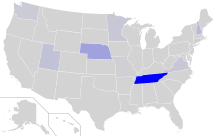
Back أمريكيون كرد Arabic آمریکا کوردلری AZB کوردانی ئەمریکا CKB کردهای آمریکا Persian Курды в США Russian
 | |
| Total population | |
|---|---|
| 40,000-100,000[1] | |
| Regions with significant populations | |
| Urban areas of southern California such as Los Angeles and San Diego, Nashville, Tennessee, and in the upper Midwest, including in Nebraska, Minnesota, and North Dakota[2] | |
| Languages | |
| Kurdish, American English | |
| Religion | |
| Mostly Islam with minorities of Atheism, Zoroastrianism & Agnosticism |
 |
Kurds in the United States (Sorani Kurdish: کوردانی ئەمریکا) refers to people born in or residing in the United States of Kurdish origin or those considered to be ethnic Kurds.
The majority of Kurdish Americans are recent migrants from Turkey, Iran, Iraq and Syria. Most have roots in Kurdistan Region (northern Iraq) or northwestern Iran.[3] The Iraqi Kurdish people comprise the largest proportion of ethnic Kurds living in the US.
The first wave of Kurdish immigrants arrived as refugees during the 1970s as a result of the Iraqi–Kurdish conflict. A second wave of Kurdish immigrants arrived in the 1990s fleeing Saddam Hussein's genocidal Anfal Campaign in northern Iraq. The most recent wave of Kurdish immigrants arrived as a result of the 2011 Syrian Civil War and the 2014 Iraqi Civil War, including a number who worked as translators for the U.S. military.[4]
In recent years, the Internet has played a large role in mobilizing the Kurdish movement, uniting diasporic communities of Kurds around the Middle East, South East Asia, European Union, Canada, the US, and Australia.[5]
- ^ "The Kurdish Diaspora". Institutkurde.org. Retrieved August 22, 2023.
- ^ The Kurds: An Encyclopedia of Life, Culture, and Society. p. 308.
- ^ "Immigrants thrive in US country music capital". Al Jazeera English. Retrieved February 1, 2014.
- ^ Sawyer, Ariana Maia (June 23, 2017). "Who are the Kurds, and why are they in Nashville?". The Tennessean. Gannett Company. Retrieved October 1, 2017.
- ^ Yeğen, Mesut (2008). "Review: The Kurdish Nationalist Movement: Opportunity, Mobilization and Identity". International Journal of Middle East Studies. 40 (3): 518–520. doi:10.1017/S0020743808081245. ISSN 0020-7438. JSTOR 40205989. S2CID 162907844. Retrieved April 13, 2015 – via JSTOR.
© MMXXIII Rich X Search. We shall prevail. All rights reserved. Rich X Search